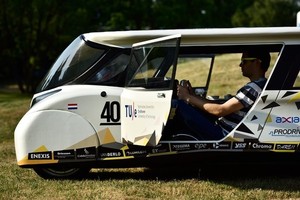
Stella a new family car that is not only powered by the sun, but generates more energy than it uses. It offers space for four travellers, is efficient, intelligent and comfortable.

Stella Lux has a reported range of over 1,000 km (621 mi) in the Dutch climate or 1,100 km (684 mi) in the Australian climate and reaches a top speed of 125 km/h (78 mph) (Credit: TU Eindhoven / Bart van Overbeeke)
Dutch students have developed a new family car that is not only powered by the sun, but generates more energy than it uses. Stella Lux seats up to four people and is designed to be efficient, intelligent and comfortable. It will compete in the World Solar Challenge in Australia later this year.

Carbon fiber and aluminum are used to keep the weight of Stella Lux down to just 375 kg (827 lb)(Credit: TU Eindhoven / Bart van Overbeeke)
Stella Lux was developed by Solar Team Eindhoven (STE), a group of 21 students from different faculties of the Eindhoven University of Technology (TU/e). The students each put their studies on hold for for a year and a half in order to work on the project, the aim of which is to create "the car of the future."

Stella Lux has a tunnel running through its center, and sports an extended roof on either side to improve its aerodynamics (Credit: TU Eindhoven / Bart van Overbeeke)
In 2013, STE developed the precursor to Stella Lux, known simply as Stella, which won the Cruiser Class of the World Solar Challenge that year. The team says that Stella proved it was possible to create a solar-powered family car, and adds its goal now is to show that such a car can also be sexy and user-friendly.
Stella Lux generates electricity via 5.8 sq m (62.4 sq ft) of solar cells and has an additional battery capacity of 15 kWh. A full charge provides a range of over 1,000 km (621 mi) in the Dutch climate or 1,100 km (684 mi) in the Australian climate, and the car has a top speed of 125 km/h (78 mph).
To achieve these figures, the car has been designed to be both lightweight and aerodynamic. Materials including carbon fiber and aluminum are used to keep the vehicle's weight down to just 375 kg (827 lb). In order to optimize aerodynamics, meanwhile, the car has a tunnel running through its center, and it sports an extended roof on either side.
The efficiency of Stella Lux is further improved by using a specially designed navigation system. The Solar Navigator system monitors weather and chooses the optimal route accordingly.
Amongst the other features of Solar Lux are the ability to unlock the car doors when a paired smartphone is nearby, a smartphone app that can prepopulate routes based on a user's calendar appointments, and a touchscreen with haptic buttons that is designed to be used without the driver taking their eyes off the road.
Stella Lux will take part in the Cruiser Class of the Bridgestone World Solar Challenge in Australia this October. The challenge itself is a 3,000 km (1,864 mi)-long race from Darwin to Adelaide, with the Cruiser Class involving an additional focus on comfort, practicality and "realizability".

Stella Lux has been developed by a group of 21 students from different faculties of the Eindhoven University of Technology (TU/e) (Credit: TU Eindhoven / Bart van Overbeeke)
A crowdfunding campaign to support STE is underway. The pitch video can be seen below.
Source: Solar Team Eindhoven
http://www.gizmag.com/stella-lux-solar-powered-family-car/38299/
